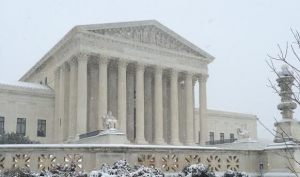Congratulations To The 2018 Bristow Fellows
Plus rankings of the law schools and lower-court judges that send the most folks into these prestigious posts.
 Earlier this week, I had the pleasure of speaking to the Cornell Federalist Society. During the Q&A after my talk, a student asked me about my book, Supreme Ambitions (affiliate link), and the world of judicial clerkships, in which the novel is set.
Earlier this week, I had the pleasure of speaking to the Cornell Federalist Society. During the Q&A after my talk, a student asked me about my book, Supreme Ambitions (affiliate link), and the world of judicial clerkships, in which the novel is set.
I responded with my usual endorsement of the clerking experience. For law students interested in becoming litigators, clerking for a judge offers an unmatched opportunity to learn about the litigation process from the other side of the bench, to receive mentorship from a distinguished member of the legal profession, and to access a phenomenal professional network — the past, present, and future clerks to your judge.
Sure, it’s not as lucrative as going into Biglaw. But it’s just a year or two, and clerkship bonuses — which could be on the rise, in the wake of Quinn Emanuel breaking the six-figure mark — help make up the shortfall on the other end. And clerking offers a résumé boost that stays with you throughout your legal career, whether you go into private practice, academia, government, or the judiciary. It’s worth noting that six out of the nine current Supreme Court justices clerked for federal judges, and four clerked for SCOTUS themselves.

The Business Case For AI At Your Law Firm

Clerking opens up opportunities that would otherwise be unavailable. For example, consider Bristow Fellowships, the prestigious one-year fellowships in the U.S. Solicitor General’s Office that allow their holders to practice before the Supreme Court just a year or two out of law school. As explained on the Justice Department website, Bristows “typically come to the fellowship after completion of a one-year judicial clerkship, most frequently with a federal appellate court judge.” Although a clerkship is not an official requirement for a Bristow, I can’t remember ever seeing a Bristow Fellow without any prior clerkship.
That holds true for the latest class of Bristow Fellowship recipients. Behold, the 2018 Bristow Fellows:
Meg Braun (Yale 2016 / Brinkema (E.D. Va.) / Katzmann)
Hunter Bruton (Duke 2016 / Duncan / Huvelle (D.D.C.))
Steve Lindsay (Yale 2017 / Griffith)
Adam Sorensen (UVA 2017 / Wilkinson)
Congratulations to these four brilliant young lawyers. Don’t be surprised if they go on to Supreme Court clerkships, a common path for a Bristow Fellow.
Sponsored

Navigating Financial Success by Avoiding Common Pitfalls and Maximizing Firm Performance

Generative AI In Legal Work — What’s Fact And What’s Fiction?


Legal AI: 3 Steps Law Firms Should Take Now

Generative AI In Legal Work — What’s Fact And What’s Fiction?

If you’d like to follow in their footsteps someday, visit the Justice Department website to learn more about the Bristow Fellowship application process. For rankings of the law schools and judges that have produced the most Bristows, along with my commentary, flip to the next page.
 David Lat is editor at large and founding editor of Above the Law, as well as the author of Supreme Ambitions: A Novel. He previously worked as a federal prosecutor in Newark, New Jersey; a litigation associate at Wachtell, Lipton, Rosen & Katz; and a law clerk to Judge Diarmuid F. O’Scannlain of the U.S. Court of Appeals for the Ninth Circuit. You can connect with David on Twitter (@DavidLat), LinkedIn, and Facebook, and you can reach him by email at dlat@abovethelaw.com.
David Lat is editor at large and founding editor of Above the Law, as well as the author of Supreme Ambitions: A Novel. He previously worked as a federal prosecutor in Newark, New Jersey; a litigation associate at Wachtell, Lipton, Rosen & Katz; and a law clerk to Judge Diarmuid F. O’Scannlain of the U.S. Court of Appeals for the Ninth Circuit. You can connect with David on Twitter (@DavidLat), LinkedIn, and Facebook, and you can reach him by email at dlat@abovethelaw.com.
Sponsored

Is The Future Of Law Distributed? Lessons From The Tech Adoption Curve








